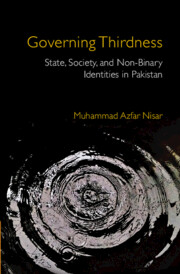Book contents
6 - Resisting Legal Thirdness
Published online by Cambridge University Press: 10 December 2021
Summary
There is no use of the third gender when one doesn't have any resources or [social] support … The Supreme Court had directed the government to give us all our rights, but their decision was not implemented. The government doesn't accept us … It [only] implemented the [part of the decision about] IDs so that it could claim it had done something for the khawaja sira. The ID doesn't provide us food or fulfill any of our basic needs. (Ashi, chose to register as a khawaja sira)
The government has done nothing for us. Allowing us to have IDs [as khawaja sira] is not a big deal. We don't even want to have IDs as khawaja sira because we can't do hajj [mandatory pilgrimage for Muslims] and then there are also other things [like share in inheritance] where we face hurdles [if we register as khawaja sira]. (Nadia, chose to register as a man)
While the Supreme Court decision and its subsequent implementation by NADRA was accompanied by much fanfare, the response of the khawaja sira to this new third gender category has been less than overwhelming, with most khawaja sira choosing to register as men instead of opting for the third gender categorization. According to a 2015 report, only 1,432 khawaja sira had opted for the third gender category introduced by NADRA (The News 2015). As the estimated number of khawaja sira in Pakistan ranges from 80,000 to 400,000 (Baig 2012; Ebrahim 2013) it implies that less than 2 per cent of the khawaja sira had registered under the third gender category since it became officially available to them in 2011. Most of my research participants who had IDs (as men) prior to the creation of the third gender category elected not to get their IDs as khawaja sira after the Supreme Court decision. More importantly, my interactions with the khawaja sira and the frontline workers of NADRA suggest that a considerable number of khawaja sira who got their IDs after the aforementioned decision still chose to register as men. Another indication of the limited appeal of the third gender category for the khawaja sira became apparent when the 2017 census of Pakistan found only 10,418 individuals in the category.
- Type
- Chapter
- Information
- Governing ThirdnessState, Society, and Non-Binary Identities in Pakistan, pp. 100 - 114Publisher: Cambridge University PressPrint publication year: 2022



